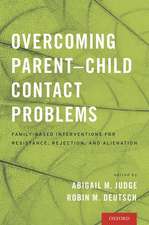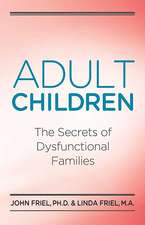7 Things Your Teenager Won't Tell You: And How to Talk about Them Anyway
Autor Jenifer Lippincott, Robin M. Deutschen Limba Engleză Paperback – 28 feb 2005
Every teenager keeps secrets, and if you're like most parents, you worry about what your kids don't tell you--especially when they prefer text messages and social networking sites to face-to-face conversation. Now this popular guide has been revised and updated to address the challenges parents face with a wired and Web-savvy generation. Jenifer Lippincott and Robin Deutsch offer a deceptively simple plan for talking to your kids that's based on a simple set of rules: Teens need to stay safe, show respect, and keep in touch--online, and in real life.
Preț: 104.18 lei
Nou
Puncte Express: 156
Preț estimativ în valută:
19.93€ • 20.82$ • 16.46£
19.93€ • 20.82$ • 16.46£
Carte disponibilă
Livrare economică 25 martie-08 aprilie
Preluare comenzi: 021 569.72.76
Specificații
ISBN-13: 9780812969597
ISBN-10: 0812969596
Pagini: 272
Dimensiuni: 133 x 205 x 13 mm
Greutate: 0.18 kg
Editura: BALLANTINE BOOKS
ISBN-10: 0812969596
Pagini: 272
Dimensiuni: 133 x 205 x 13 mm
Greutate: 0.18 kg
Editura: BALLANTINE BOOKS
Notă biografică
Jenifer Marshall Lippincott has worked with adolescents for more than two decades as a teacher, dean, and learning consultant. She holds a master’s degree in human development from Harvard University. She lives in Washington, D.C., with her husband and two adolescents.
Robin M. Deutsch, PhD., is the director of the Center of Excellence for Children, Families, and the Law at the Massachusetts School of Professional Psychology, a consultant in the department of psychiatry at Massachusetts General Hospital, and an associate clinical professor at Harvard Medical School. In her psychology practice, she sees children, adolescents, and parents. She successfully survived the adolescence of a son and a daughter.
Robin M. Deutsch, PhD., is the director of the Center of Excellence for Children, Families, and the Law at the Massachusetts School of Professional Psychology, a consultant in the department of psychiatry at Massachusetts General Hospital, and an associate clinical professor at Harvard Medical School. In her psychology practice, she sees children, adolescents, and parents. She successfully survived the adolescence of a son and a daughter.
Extras
The Rules of Play
Is it possible to achieve lasting peace during our children’s adolescence under the guidance of only three commandments: Stay safe; show respect; keep in touch? While these three simple rules may not guarantee a smooth ride through adolescence, they can ease some of the stresses that tend to ambush our teens—and us—as we all struggle toward (their) adulthood.
Our Own Adolescence—A Look Back
Though we’ve all searched, few of us have found a reliable way to hold a conversation with our adolescents that consistently evades conflict, or at least contention. Why is it so easy to forget that we’re the grown-ups? Too often, the moment we detect static in the communication lines with our adolescents, we tend to rush to the defensive, either for protection or to rack up another parenting victory.
Us: Don’t you speak to me in that tone of voice! Keep it up and you can forget your plans for the weekend.
Meant as harmless pinpricks aimed at our adolescents’ psyches, these types of ultimatums tend to choke off most conversations, leaving tempers smoldering.
Them: You can’t do that! You know I already have plans. Why do you always have to spoil everything?
This kind of conversational tack rarely heads in a positive direction.
Frazzled by these types of savaged conversations, we wonder why we are not entitled to wear the same cloak of respect as that of our parents. While theirs fit squarely upon shoulders that flaunted an air of unassailable power, that same cloak hangs awkwardly on us, out of style and ill fitting. Lest we forget, our parents ruled in a different kingdom, and many of us, as their subjects, were not always the loyal followers that they believed us to be.
Why aren’t we able to engender the same obsequiousness in our adolescents as many of us conveyed to our parents? As products of a different era, we came of age in a time when the fruits of our parents’ labors bought us, their offspring, the ultimate luxury—free time. Unleashed from the burden of contributing to family survival, we never questioned the leisurely pace with which we were allowed to saunter through our pre-adult years, urged to learn and explore to our heart’s content, rewarded for any glory that showcased our parents’ successes (however modest by today’s standards).
Our parents, whether participants or direct descendants of a victorious postwar generation, led the charge to create a better one, decorated with opportunity, cushioned by heightened levels of comfort. Conceived in glory, we, as the lucky benefactors, were liberated from societal debts or struggle for anything but our own causes. And so we became the early adapters, the birthright members of a whole new era of adolescence. With a mandate to go forth and excel, we were fearless in our pursuit of our parents’ promises.
Wanting for little, we searched for more and in doing so created loftier goals and even higher aspirations than a comfortable home, a car or two in the driveway, and the promise of a good education. Time and opportunity allowed us to both experiment and question. Through experimentation, we proved that boundaries confined only the meek. Better jobs, more money, higher pinnacles of success were all achievable. Through questioning, we discovered that nothing was sacrosanct, not our parents’ authority, not the government, not even the law. Regardless of the degree of difficulty of our personal journeys through adolescence, we proved it to be a profitable investment for our parents, thereby entrenching it as a necessary and essential gateway to adulthood.
Why the history lesson? Perhaps to shed new light on why our adolescents think, act, and speak differently than we did. Perhaps because to change the future requires a fresh look at the past.
Today’s Adolescent—What’s Changed?
Raised from birth on a nutritious diet of activities, lessons, and above all encouragement, our teenagers seem to thrive as we escort them from one expectation to the next. Whether in school, on sports teams, via music lessons, or through countless other releases from tolls of responsibility except to excel, we strive, because we can, to eradicate any hindrances that could divert their focus from our intended outcomes. By heaping on copious praise for any effort or positive intention, rather than for jobs actually well done—by encouraging and engaging them to “use their words,” to discuss, negotiate, and query, rather than practice and demonstrate—we may have entrenched our adolescents even further in an accountability abyss where their sole purpose is to do us proud. By removing a sense of usefulness at a time when they are struggling the hardest to define themselves, have we inadvertently cut off one of their natural sources of self-worth? What does it say about us that frequent articles in major newspapers cite incidents of parents employing “aggressive,” “devious,” even “fraudulent” tactics, all in the name of getting their kids into desired schools ranging from preschool to college? Desired by whom? we might ask. Where are the data connecting higher grades to achievement or even contentment in life? What does it say about our adolescents when a recent study on the ethics of American youth finds that despite significant increases over the past ten years in lying, stealing, and cheating, 76 percent believe that they are “better than most people” they know when it comes to doing the right thing? Perhaps we have done a better job of inflating their egos than bolstering their consciences.
What do you want from me? we often hear them plead. We want you to succeed, we implore. We want you to do your best, to feel good about yourself. We want them to have had a happy childhood, we rationalize.
So we pledge anew to do whatever we can to enable their success. Too often, though, in our eagerness to pass on a legacy of parental generosity, we overlook the critical proteins of sacrifice and responsibility.
Them: Mom, c’mon, I’m late for school. I’ll clean up my room when I get home.
Us: That’s what you said yesterday. You know our agreement is that you at least make your bed—before school. You also know that it’s one of your responsibilities as a family member.
Them: I know, I know. But do you want me to be late for school? I just didn’t have time this morning. Cut me a break, why don’t you?
And so the dilemma goes:
No, we don’t want them to be late for school (or miss out on any fun or opportunity that presents itself, especially if it could reflect badly on them or, worse, on us).
Yes, we are frustrated because this isn’t the first or the fifth time or even the twenty-fifth time they’ve neglected a responsibility.
Yes, we are annoyed that they don’t seem to understand that, in the grand scheme of things, straightening one’s room is a very small task, and one of the few that’s asked of them, but . . . (see next bullet).
Though this may not be a skirmish worth escalating into a full-on battle, any mutually agreed-upon responsibility should be accounted for. (As a matter of fact, a survey of 639 adolescents regarding their practices related to a host of adolescent issues, such as drinking, smoking marijuana, sex, eating, school performance, and more, found that one of the common denominators among the 12.5 percent who were “too good to be true” was a requirement that they keep their rooms clean. Other common denominators were frequent family dinners, intact family units, no phones in rooms, and some type of community service.)
How do we deal with the plight of the long-term investment versus the short-term gain when it comes to raising our teenagers? What rules do we put in place that acknowledge the same loopholes we discovered, indeed created, in our parents’ parenting, yet allow our adolescents to discover the benefit to their own self-image of even the smallest contribution?
The good news is that it is never too late to change our parenting practices. The better news is that it’s simpler than we think.
Is it possible to achieve lasting peace during our children’s adolescence under the guidance of only three commandments: Stay safe; show respect; keep in touch? While these three simple rules may not guarantee a smooth ride through adolescence, they can ease some of the stresses that tend to ambush our teens—and us—as we all struggle toward (their) adulthood.
Our Own Adolescence—A Look Back
Though we’ve all searched, few of us have found a reliable way to hold a conversation with our adolescents that consistently evades conflict, or at least contention. Why is it so easy to forget that we’re the grown-ups? Too often, the moment we detect static in the communication lines with our adolescents, we tend to rush to the defensive, either for protection or to rack up another parenting victory.
Us: Don’t you speak to me in that tone of voice! Keep it up and you can forget your plans for the weekend.
Meant as harmless pinpricks aimed at our adolescents’ psyches, these types of ultimatums tend to choke off most conversations, leaving tempers smoldering.
Them: You can’t do that! You know I already have plans. Why do you always have to spoil everything?
This kind of conversational tack rarely heads in a positive direction.
Frazzled by these types of savaged conversations, we wonder why we are not entitled to wear the same cloak of respect as that of our parents. While theirs fit squarely upon shoulders that flaunted an air of unassailable power, that same cloak hangs awkwardly on us, out of style and ill fitting. Lest we forget, our parents ruled in a different kingdom, and many of us, as their subjects, were not always the loyal followers that they believed us to be.
Why aren’t we able to engender the same obsequiousness in our adolescents as many of us conveyed to our parents? As products of a different era, we came of age in a time when the fruits of our parents’ labors bought us, their offspring, the ultimate luxury—free time. Unleashed from the burden of contributing to family survival, we never questioned the leisurely pace with which we were allowed to saunter through our pre-adult years, urged to learn and explore to our heart’s content, rewarded for any glory that showcased our parents’ successes (however modest by today’s standards).
Our parents, whether participants or direct descendants of a victorious postwar generation, led the charge to create a better one, decorated with opportunity, cushioned by heightened levels of comfort. Conceived in glory, we, as the lucky benefactors, were liberated from societal debts or struggle for anything but our own causes. And so we became the early adapters, the birthright members of a whole new era of adolescence. With a mandate to go forth and excel, we were fearless in our pursuit of our parents’ promises.
Wanting for little, we searched for more and in doing so created loftier goals and even higher aspirations than a comfortable home, a car or two in the driveway, and the promise of a good education. Time and opportunity allowed us to both experiment and question. Through experimentation, we proved that boundaries confined only the meek. Better jobs, more money, higher pinnacles of success were all achievable. Through questioning, we discovered that nothing was sacrosanct, not our parents’ authority, not the government, not even the law. Regardless of the degree of difficulty of our personal journeys through adolescence, we proved it to be a profitable investment for our parents, thereby entrenching it as a necessary and essential gateway to adulthood.
Why the history lesson? Perhaps to shed new light on why our adolescents think, act, and speak differently than we did. Perhaps because to change the future requires a fresh look at the past.
Today’s Adolescent—What’s Changed?
Raised from birth on a nutritious diet of activities, lessons, and above all encouragement, our teenagers seem to thrive as we escort them from one expectation to the next. Whether in school, on sports teams, via music lessons, or through countless other releases from tolls of responsibility except to excel, we strive, because we can, to eradicate any hindrances that could divert their focus from our intended outcomes. By heaping on copious praise for any effort or positive intention, rather than for jobs actually well done—by encouraging and engaging them to “use their words,” to discuss, negotiate, and query, rather than practice and demonstrate—we may have entrenched our adolescents even further in an accountability abyss where their sole purpose is to do us proud. By removing a sense of usefulness at a time when they are struggling the hardest to define themselves, have we inadvertently cut off one of their natural sources of self-worth? What does it say about us that frequent articles in major newspapers cite incidents of parents employing “aggressive,” “devious,” even “fraudulent” tactics, all in the name of getting their kids into desired schools ranging from preschool to college? Desired by whom? we might ask. Where are the data connecting higher grades to achievement or even contentment in life? What does it say about our adolescents when a recent study on the ethics of American youth finds that despite significant increases over the past ten years in lying, stealing, and cheating, 76 percent believe that they are “better than most people” they know when it comes to doing the right thing? Perhaps we have done a better job of inflating their egos than bolstering their consciences.
What do you want from me? we often hear them plead. We want you to succeed, we implore. We want you to do your best, to feel good about yourself. We want them to have had a happy childhood, we rationalize.
So we pledge anew to do whatever we can to enable their success. Too often, though, in our eagerness to pass on a legacy of parental generosity, we overlook the critical proteins of sacrifice and responsibility.
Them: Mom, c’mon, I’m late for school. I’ll clean up my room when I get home.
Us: That’s what you said yesterday. You know our agreement is that you at least make your bed—before school. You also know that it’s one of your responsibilities as a family member.
Them: I know, I know. But do you want me to be late for school? I just didn’t have time this morning. Cut me a break, why don’t you?
And so the dilemma goes:
No, we don’t want them to be late for school (or miss out on any fun or opportunity that presents itself, especially if it could reflect badly on them or, worse, on us).
Yes, we are frustrated because this isn’t the first or the fifth time or even the twenty-fifth time they’ve neglected a responsibility.
Yes, we are annoyed that they don’t seem to understand that, in the grand scheme of things, straightening one’s room is a very small task, and one of the few that’s asked of them, but . . . (see next bullet).
Though this may not be a skirmish worth escalating into a full-on battle, any mutually agreed-upon responsibility should be accounted for. (As a matter of fact, a survey of 639 adolescents regarding their practices related to a host of adolescent issues, such as drinking, smoking marijuana, sex, eating, school performance, and more, found that one of the common denominators among the 12.5 percent who were “too good to be true” was a requirement that they keep their rooms clean. Other common denominators were frequent family dinners, intact family units, no phones in rooms, and some type of community service.)
How do we deal with the plight of the long-term investment versus the short-term gain when it comes to raising our teenagers? What rules do we put in place that acknowledge the same loopholes we discovered, indeed created, in our parents’ parenting, yet allow our adolescents to discover the benefit to their own self-image of even the smallest contribution?
The good news is that it is never too late to change our parenting practices. The better news is that it’s simpler than we think.
Recenzii
“Page-turners are rare on the parenting bookshelf, but Lippincott and Deutsch have given us just that. Their insights, humor, and excellent judgment make this a must for parents looking for the road map through the adolescent minefield. It is worth every minute you spend with them.”—Kyle Pruett, M.D., professor of child psychiatry, Yale School of Medicine, co-author of Partnership Parenting
“7 Things Your Teenager Won’t Tell You provides valuable new insights based on contemporary research, while showing parents how to identify the seven features of adolescent thinking through language and behavior. This book offers not only the understanding that is essential to effective and supportive communication but also helpful examples of how to put that understanding into practice.”—David Elkind, PhD., author of The Hurried Child
“Sound, concrete advice . . . This book gives a wealth of examples to help guide parents who struggle to stay connected during this critical time in their children’s lives. I highly recommend it.”—Alvin F. Poussaint, M.D., professor of psychiatry, Harvard Medical School
“All teens pose unique challenges to their poor unsuspecting parents, but thankfully there are some commonalities. This book shares them with a goldmine of information, and offers concrete suggestions on how to deal.”—Robin Raskin, former editor-in-chief of Family PC magazine
“7 Things Your Teenager Won’t Tell You provides valuable new insights based on contemporary research, while showing parents how to identify the seven features of adolescent thinking through language and behavior. This book offers not only the understanding that is essential to effective and supportive communication but also helpful examples of how to put that understanding into practice.”—David Elkind, PhD., author of The Hurried Child
“Sound, concrete advice . . . This book gives a wealth of examples to help guide parents who struggle to stay connected during this critical time in their children’s lives. I highly recommend it.”—Alvin F. Poussaint, M.D., professor of psychiatry, Harvard Medical School
“All teens pose unique challenges to their poor unsuspecting parents, but thankfully there are some commonalities. This book shares them with a goldmine of information, and offers concrete suggestions on how to deal.”—Robin Raskin, former editor-in-chief of Family PC magazine
Descriere
With straight talk to parents about talking to teens to help them stay safe, this groundbreaking book offers effective conversational strategies designed to avoid the dead-ends and pitfalls that plague most parent-teen interactions.

















